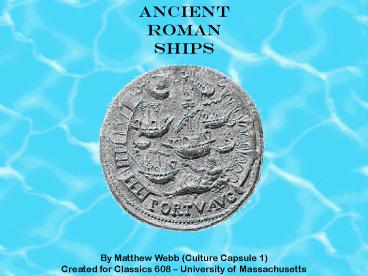ANCIENT PowerPoint PPT Presentation
1 / 18
Title: ANCIENT
1
ANCIENT ROMAN SHIPS
By Matthew Webb (Culture Capsule 1) Created for
Classics 608 University of Massachusetts
2
SMALL HARBOR CRAFT
Fishing boats
3
SMALL HARBOR CRAFT
Fishing boats
Remains discovered at Ostia
4
SMALL HARBOR CRAFT
An example of a navis cubiculata or inspection
ship
5
LARGe merchant ships
Chiefly propelled by one large square
sail Steering by two large oars in the back, not
rudders
6
LARGe merchant ships
Transported 20-600 tons of goods Often at least
50 feet in length
7
LARGe merchant ships
8
LARGe merchant ships
Remains discovered at Ostia
9
LARGe merchant ships
Large merchant ships were too large to navigate
the Tiber. Goods were transferred to smaller
ships.
10
LARGe merchant ships
These smaller ships were pulled by oxen up the
Tiber via tracking. Goods were offloaded at the
aptly-named Forum Boarium in Rome.
11
WARSHIPS
Up to the 1st and 2nd centuries BC, the Roman
navy was mostly drawn from allies in Italy and
Greece. After the Battle of Actium in 31BC,
Augustus established a permanent Roman
navy. There are many types of ancient Roman
warships. Here are the most common LIBURNIAN Ori
ginally a pirate ship, then became a standard
Roman warship. Had two oar-banks. BIREME Two
oar-banks per side. TRIREME Main type of warship
in the Mediterranean. Main weapon the battering
ram the ship would ram other ships
sides. Could be as heavy as 230 tons, as long as
45 meters, as fast as 8 knots. Three oar-banks
(one above the other) one each side. All oars
only used during battle.
12
WARSHIPS
Liburnian or Bireme. Note the battering ram on
the prow. Note also the two steering oars
protruding from the back.
13
WARSHIPS
Liburnian or Bireme. Note the painting on the
ship and the eyes on the prow.
14
WARSHIPS
Trireme
15
WARSHIPS
Naumachia (naval battle) among four warships.
16
DIFFERENCES
There are various ways to tell the difference
between a Roman merchant ship and a Roman
warship. PROPULSION Small merchant or fishing
ships are generally poled or pulled via
oxen. Large merchant ships have one large square
sail. Warships most often are rowed by
oars. DIMENSIONS Merchant ships generally have a
lengthbreadth ratio of 21. Warships generally
have a lengthbreadth ratio of 101. SHAPE The
hulls are shaped differently. Warships often have
a battering ram at the front. CONSTRUCTION Warshi
ps are constructed of better-quality materials
and are characterized by better workmanship.
17
Construction
Unique construction technique The outer planking
is laid upon the keel and then the internal
skeleton of frames and beams is inserted.
18
LIFE ON A ROMAN SHIP
Archaeologists have discovered a number of items
that give us clues into the life of a sailor on a
merchant ship or warship. FOOD Drinking water,
wine, oil, garum, cereals and grindstones,
olives, fresh fruit, beans, smoked and salted
meats BUSINESS LEISURE Coins, scales, needles,
fishing gear, medicines, amphorae, baskets,
sacks, clothes, shoes, dice RELIGION Portable
altars, images and statues of the gods

